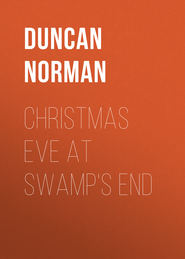По всем вопросам обращайтесь на: info@litportal.ru
(©) 2003-2024.
✖
Billy Topsail & Company: A Story for Boys
Настройки чтения
Размер шрифта
Высота строк
Поля
“No,” said Archie, grave with his little problem of honour; “but I wouldn’t let a lady in for a thing like that.”
“Son,” said Sir Archibald, now all at once turning very serious, “you have better security than your pony and sloop.”
Archie looked up in bewilderment.
“It is your integrity,” Sir Archibald explained, gently, “and your efficiency.”
Archie flushed with pleasure.
“These are great things to possess,” said Sir Archibald.
“Thank you, sir,” said Archie, rising in acknowledgment of this hearty compliment.
The lad was genuinely moved.
CHAPTER XXIV
In Which the Honour of Archie Armstrong Becomes Involved, the First of September Becomes a Date of Utmost Importance, He Collides With Tom Tulk, and a Note is Made in the Book of the Future
Sir Archibald began again to tap the desk with his finger-tips. Archie strayed to the broad window and looked out upon the wharves and harbour.
“Is that the Black Eagle at the wharf?” he asked.
“The Black Eagle, sure enough!” Sir Archibald laughed. “She’s the White Bay and French Shore trader.”
“Trade enough for all,” Archie returned.
“George Rumm, master,” said Sir Archibald.
“Still?” Archie exclaimed.
The sailing reputation of Skipper George had been in question through the season. He had come within six inches of losing the Black Eagle in a small gale of the last voyage.
“Who’s clerk?” Archie asked.
“Tommy Bull, boy.”
No friend of Archie!
“Sharp enough, anyhow,” the boy thought.
Sir Archibald put his hands in his pockets again and began to pace the floor; his lips were pursed, his brows drawn. Archie waited anxiously at the window.
“When,” demanded Sir Archibald, pausing abruptly in his walk–“when do you propose to liquidate this debt?”
“We’ll sail the Spot Cash into St. John’s harbour, sir, on September first, or before.”
“With three hundred quintals of fish in her hold, I suppose?”
Three hundred quintals of dry fish, at four dollars, roughly, a quintal, was twelve hundred dollars.
“More than that, sir,” said Archie.
“Well, boy,” said Sir Archibald, briskly, “the security I have spoken of is all right, and–”
“Not worth much at auction sale,” Archie interrupted, grinning.
“There’s no better security in the world,” said Sir Archibald, “than youth, integrity and capacity.”
Archie waited.
“I’ll back you,” said Sir Archibald, shortly.
“Father,” Archie declared, his eyes shining with a little mist of delight and affection, “I’ll stand by this thing for all I’m worth!”
They shook hands upon it.
Sir Archibald presently wrote a check and scribbled a few lines on a slip of paper. The check was for two hundred and fifty dollars; it was for running expenses and emergencies that Archie needed the hard cash. The slip of paper was an order upon the warehouses and shops for credit in the sum of seven hundred and fifty dollars.
“Now,” said Sir Archibald, “it is explicitly understood between us that on or before the first of September you are to turn over to the firm of Armstrong & Company a sufficient quantity of properly cured fish to liquidate this account.”
“Yes, sir,” Archie replied, earnestly; “on or before the first day of September next.”
“You perfectly understand the terms?” Sir Archibald insisted. “You know the nature of this obligation?”
“Yes, sir.”
“Very well, son,” said Sir Archibald; “your honour is involved.”
Archie received the two slips of paper. It must be confessed that they burned his fingers a little. It was a good deal to come into possession of all at once–a good deal of money and an awe-inspiring responsibility. Sir Archibald watched the boy’s face narrowly. He seemed to be pleased with what he found there–a little fear, a little anxiety, a great deal of determination. The veteran business man wondered if the boy would sleep as easily as usual that night. Would he wake up fresh and smiling in the morning? These were large cares to lie upon the shoulders of a lad.
“Shall I give you a–well–a receipt–or a note–or anything like that?” Archie asked.
“You are upon your honour,” said his father.
Archie scratched his head in doubt.
“Your honour,” Sir Archibald repeated, smiling.
“The first of September,” Archie laughed. “I shan’t forget that date.”
In the end he had good cause to remember it.
Before Archie left the office Sir Archibald led him to the broad window behind the desk. Archie was used to this. It was his father’s habit. The thing was not done in a spirit of boasting, as the boy was very well aware. Nor was it an attempt to impress the boy with a sense of his own importance and future wealth in the world. It was rather a well-considered and consistent effort to give him a sense of the reality and gravity of the obligations that would some day be his. From the broad window Archie looked out once more upon the various activities of his father’s great business. There were schooners fitting out for the fishing cruise to the Labrador; there were traders taking in stores for the voyage to the Straits of Belle Isle, to the South Coast, to the French Shore; there were fore-and-afters outbound to the Grand Banks and waiting for a favourable wind; there were coastwise vessels, loading flour and pork for the outport merchants; there were barques awaiting more favourable weather in which to load salt-cod for the West Indies and Spain.
All this never failed to oppress Archie a little as viewed from the broad window of his father’s office.
“Look!” said Sir Archibald, moving a hand to include the shipping and storehouses.











